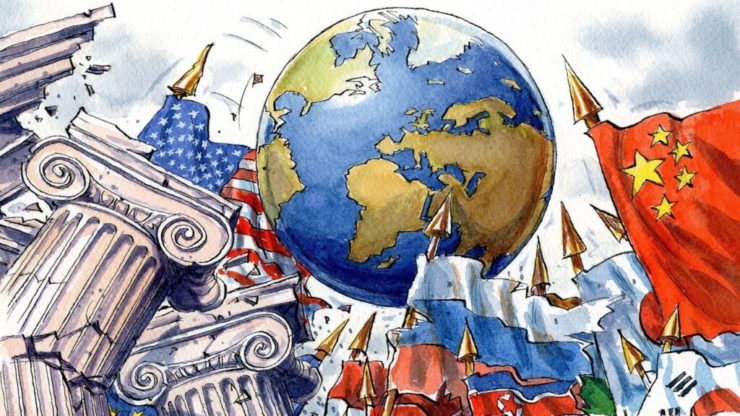
The return on stage of “The End of History and Last Man” by Francis Fukuyama (1992) and the questioning of “The Clash of Civilizations” by Samuel P. Huntington (1996), it is implicitly the end of the West and the emergence of the new multipolar world order. The BRICS alliance is at the heart of the transit dynamic and constitutes the engine of Multipolarism. The recent official trips of Vladimir Putin and Xi Jinping are part of this logic of rupture with the imposed unipolar world order inherited from the fall of the Berlin Wall in 1989 and the illusion of the end of the Cold War in 1991.
This article discusses the challenges of Western dominance in the international system, highlighting various perspectives on the changing dynamics of global power. It addresses historical narratives, geopolitical analyses, and contemporary changes in global influence. This article, which is intended to be a discourse on the end of the West, encompasses a multifaceted examination of the factors contributing to the erosion of traditional Western hegemony in world affairs, which should be included in a Sui generis approach.
In this inaugural lesson on the lamentable and humiliating end of the West and the emergence of glorious Multipolarism revolves around the historical evolution of Western imperialism, geopolitical transformations, changes of power, challenges to Western norms, impact on international relations and implications for global governance.
The historical evolution of Western imperialism
The annals of international relations history suggest that after decades of unchallenged dominance, the Western monopoly on power is increasingly being challenged by emerging forces from the South. We describe this shift as a natural progression reflecting historical cycles of power realignment. Based on the aggressive philosophy of Russia haters and the Global South from Zbigniew Brzezinski’s plot, Western domination has taken off since the fall of the Berlin Wall in 1989 and the illusion of the end of the Cold War in 1991, with NATO as its instrument of terror.
Profound geopolitical transformations
It emerges from the analysis of the international geopolitical context that recent events, such as geopolitical tensions, economic disparities and ideological contestations, have highlighted the vulnerabilities of Western hegemony. The rise of non-Western powers (BRICS) and the resurgence of nationalism (Brexit) in some Western countries have further complicated global power dynamics.
Global power shifts
Recent developments on the global stage underscore a reconfiguration of global power structures, with calls for a more equitable distribution of influence and resources among nations. The emergence of new centers of power and new alliances signals a break with the unipolar world order dominated by Western powers after World War II.
Challenges to Western standards
For decades, criticism of Western norms and practices, including accusations of exploitation, inequality and cultural imperialism, has fueled anti-Western sentiments in various regions. These challenges call into question the legitimacy and universality of Western values and governance models.
The impact on international relations
The reality is that the changing landscape of international relations requires a reassessment of traditional power dynamics and diplomatic strategies. Countries are being asked to adapt to a more multipolar world characterized by diverse interests and competing narratives. The BRICS alliance is the locomotive of this new world order.
Implications for global governance
The decline of Western dominance raises questions about the future of global governance structures like the United Nations Security Council and international financial institutions that have been under the heel of the West since their inception. Calls to reform these institutions to reflect contemporary power distributions are gaining ground. Which we have discussed extensively in a previous article.
In light of the above, we can deduce that the discourse on the end of the West (the end of its domination over the world) reflects a complex interaction of historical legacies, geopolitical changes, normative contestations and calls to a more inclusive world order. As debates continue about the implications of this transition, it is clear that the era of contested Western hegemony is giving way to a more multipolar and uncontested global scene.
Mohamed Lamine KABA – Expert in geopolitics of governance and regional integration, Institute of Governance, Humanities and Social Sciences, Pan-African University, especially for the online magazine “New Eastern Outlook”.
